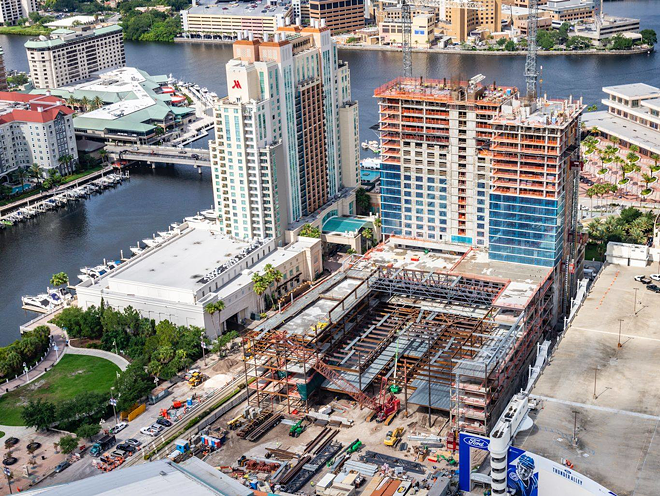UPDATED: 11/22/19 5:28 p.m.
Tampa’s poorest residents would have to spend more than three times their recommended rental rates in order to afford an apartment at local billionaire Jeff Vinik’s new downtown Tampa luxury development, which accepted a giant tax break meant for the city’s poorest residents.
Back in 2017, Jeff Vinik — Tampa Bay Lightning owner and major investor in the Tampa Bay Times — announced a $3 billion redevelopment plan for a giant tract of land next to Amalie Arena along with Strategic Property Partners, a joint venture between Vinik and Bill Gates’ Cascade Investment.
Vinik’s plan, called Water Street Tampa, includes space for 3,500 residential units, a luxury hotel, shops and restaurants, and argues that it will give a significant facelift to an area that was previously just surface parking lots.
It’s also worth pointing out that this same area is one of Tampa’s most affluent neighborhoods, with a median family income almost twice as high as the Tampa metro area, and it just so happens to sit right next to Vinik’s hockey arena.
Of course, this is problematic because the tax break was framed as a way to help spur development in the nation’s low-income neighborhoods.
According to a damning report released last week from the nonprofit publication ProPublica, back in 2018 Vinik’s project, and the City of Tampa, applied for a tax cut from the Trump Administration that was supposed to benefit poor residents, called “opportunity zones,” and he got it, but only after lobbying and donating to then-governor Rick Scott.
The report, which is definitely worth reading in its entirety, basically makes the argument that Scott overlooked actual projects that benefited the poor, and instead gave preference to Florida’s billionaires, who now avoid paying capital gains taxes on their own pet projects, like Water Street.
Obviously this looked terrible for Vinik, and so last week the Strategic Property Partners chief executive officer Jeff Nozar, reportedly told an audience at Café con Tampa that the project was not a “luxury development.”
RELATED: The average Tampa resident can only afford a 619-square-foot apartment, study says
Nozar didn’t say exactly what the rental rates will be, but according to the Tampa Bay Times, he did say that the first 1,350 units at Water Street would be “market rate housing,” and that “the housing that we’re providing is in the range of 50 to 80 percent of median area income. Typically developers require an incentive to build that.”
Without giving any details, Nozar also said “the “company is exploring ways to widen affordability opportunities in its second and third phases.”
As the Times report pointed out, “according to U.S. Housing and Urban Development calculations, 50 to 80 percent of the median area income for a family of four ranges from $33,450 to $53,500.”
This is an important figure to highlight, because the problem here is that “market rate housing” in Tampa is already incredibly overpriced for the area’s poorest residents, the very people the tax break was supposed to eventually benefit.
According to a report released today from real estate site RentCafe, the market rate rents for last October in Tampa averaged $1,339 (up 3.6% from the previous year). This means that people interested in living in Vinik’s development would have to make at the very least $53,467 per year to avoid being “rent-burdened,” which means you pay no more than 30% of your income on housing.
But someone making $53,467 a year hardly qualifies as one of the area’s poorest residents.
Florida’s current minimum wage is $8.46 an hour, which comes out to roughly $16,920 a year if you work a normal 50 weeks a year and 40 hours a week. So, in order to not be rent burdened, this hypothetical person can only afford $432 a month at Water Street, or spend the average market rate, which is currently three times what they can actually afford.
When asked to comment on why the project’s market rate rental costs are significantly higher than what Tampa’s low-income residents can afford, and how the project plans to achieve affordable rents, while also maintaining the "opportunity zone" designation, a spokesperson for Strategic Property Partners told Creative Loafing Tampa Bay that “SPP has no comment.”
RELATED: Trump’s tax break for poor people went to Jeff Vinik’s luxury Tampa development
But Vinik’s development is only the tip of a much bigger problem: With an abundance of stagnant, low paying wages and a growing wealth gap, Tampa Bay residents desperately need more affordable housing options. According to a 2019 report from the National Low Income Housing Coalition, renters in the Tampa Bay area making minimum wage would have to work 83 hours a week to afford a one-bedroom apartment at $916 a month. This means if they want to live at Water Street (at $1,399 a month), they would have to work roughly 126 hours a week, or seventeen hours a day.
Whether they live at Vinik's development or not, this is practically impossible.
And, no thanks to projects like Water Street, which will surely provide more low paying jobs for Tampa residents to commute to, it’s only going to get worse. A recent study from MIT, found that an adult needs to make $12.15 an hour, at the very least, to cover the absolute bare minimums in Hillsborough County. This would leave a Tampa resident with $607.50 a month for rent, and this wouldn’t even cover half of what it would cost to live at Water Street.
Of course, you could argue that Tampa’s poorest residents should just find roommates, or apply for housing assistance, or take on another job, but these are options that are often not feasible for senior citizens, single parents, the disabled, etc.
If the units won't be affordable for Tampa's low-income residents, then will the Water Street development pay the thousands of hotel workers, bartenders, servers, and valets a "living wage?" So far, they haven't said.
So, the question’s remains: If Vinik’s development accepted a giant tax break to help Tampa’s poor, then how exactly does Water Street benefit the poor?
In all likelihood it won't, and perhaps this was all by design.
Follow @cl_tampabay on Twitter to get the most up-to-date news + views. Subscribe to our newsletter, too.




